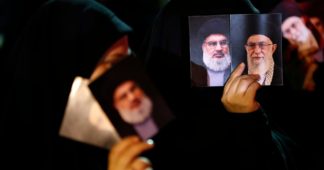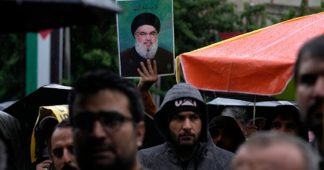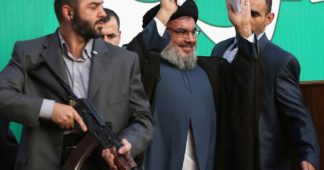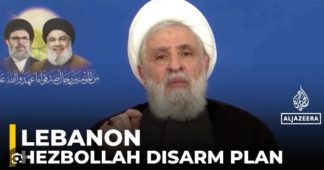By Palestine Chronicle Staff
Sep 27, 2025
Sheikh Qassem emphasized that while Hezbollah remains committed to national unity, this unity must be focused on shared defense against the external enemy.
Commemorating the first anniversary of the passing of two of its most prominent leaders, Sayyed Hassan Nasrallah and Sayyed Hashem Safi al-Din, Hezbollah convened a significant gathering in its stronghold in the Southern Suburb (Dahiyeh) of Beirut. The event served as a platform for Hezbollah Secretary-General Sheikh Naim Qassem to deliver a firm political address, unequivocally stating that the Resistance “will not leave the field and will not give up its weapons.”
The address was closely watched, framing the movement’s determined opposition to both domestic political initiatives and sustained international pressure. Sheikh Qassem affirmed that any attempt to dismantle Hezbollah’s military structure would be met with what he termed an “ultimate, Karbala-like confrontation.” This term, a significant cultural reference within Shia Islam to an uncompromising struggle for principle, signals the organization’s view of its armed status as an existential, ideological duty.
Qassem asserted that despite facing substantial military and political challenges over the past year, the movement has successfully consolidated its strength. He declared that the Resistance has not only endured but has “recovered its fighting capacity,” underscoring the organization’s resilience and readiness for continued defense.
VIDEO | One year since his assassination, we select a few of the unforgettable stances of late Hezbollah secretary-general Hassan Nasrallah throughout his life and political journey. pic.twitter.com/hZJtcMtXYM
— The Cradle (@TheCradleMedia) September 27, 2025
Confronting the Disarmament Initiative
A central point of friction addressed by Sheikh Qassem was the recent policy adopted by the Lebanese government under Prime Minister Nawaf Salam’s administration, which aims at confining all weapons to the state and implementing the measure incrementally.
Qassem directly challenged this initiative, describing the government’s approval of the plan as a “sin” against the Resistance. He called for an immediate correction of this decision. The Secretary-General argued that this domestic policy decision directly accommodates external hostile interests, stating that disarming Hezbollah would mean “removing our strength in compliance with Israel’s demand” and achieving its strategic objectives. Consequently, he stated that the movement “will confront any project that serves Israel, even if it is cloaked in national attire” by local political actors.
He also addressed the role of the United States, asserting that Washington is attempting to “achieve through politics what Israel could not accomplish by military force.” Qassem suggested that statements from US envoys, such as Tom Barrack, clearly indicate a broader regional agenda that seeks to diminish Lebanon’s independent resistance capabilities.
BREAKING: The moment the body of Hezbollah Secretary-General Hassan Nasrallah was retrieved from the bombing site in Haret Hreik, in southern Beirut. pic.twitter.com/EjZgmgG1ck
— The Palestine Chronicle (@PalestineChron) September 29, 2024
Warnings Against Internal Division
The address included strong warnings regarding the risk of internal strife. Sheikh Qassem emphasized that while Hezbollah remains committed to national unity, this unity must be focused on shared defense against the external enemy. He accused certain political rivals of attempting to deliberately create fissures within the country.
He strongly warned against attempts to incite the Lebanese Army to confront its own people and its resistance fighters. In a vivid metaphor aimed at those he views as undermining the nation’s security for political gain, Qassem stated: “They are piercing the ship from their side, but it will sink everyone.”
Regarding state affairs, Qassem called for the full implementation of the Taif Agreement, the national charter designed to end the civil war. He specified that the agreement mandates the liberation of all Lebanese lands from occupation, arguing that this necessitates the continued role of the Resistance to facilitate the extension of state authority.
Furthermore, he affirmed that Lebanon has fulfilled its duties under UN Security Council Resolution 1701, which ended the 2006 conflict, and called on Israel to fulfill its reciprocal obligations under the resolution. He also called for the upcoming parliamentary elections to be held as scheduled and according to the current legal framework.
Political Juxtaposition
The event was attended by Ali Larijani, the Iranian Secretary of the Supreme National Security Council, highlighting the regional alignment of the movement. Larijani addressed Western concerns over arms supplies, stating that Hezbollah is already powerful and “does not require arms supplies from elsewhere.” He also issued a diplomatic challenge to Washington, insisting that the US should “not appoint itself as the custodian of the Lebanese people.”
Crucially, the diplomatic exchanges surrounding the event revealed the sharp political dichotomy within Lebanon’s leadership:
Prime Minister Nawaf Salam, during his meeting with Larijani, underscored that relations between Beirut and Tehran must be built on the principle of mutual respect for the sovereignty of both nations and strict non-interference in internal affairs—a clear message reinforcing the state’s independent foreign policy.
President Joseph Aoun also contributed to the official state narrative. While recognizing the sacrifices of the fallen, he insisted that the highest form of loyalty is demonstrated through commitment to building a “strong, single, and just state.” Aoun emphasized that salvation for Lebanon lies solely in the consolidation of a single state, one army, and effective constitutional institutions that protect the nation’s dignity and sovereignty for all citizens.
A never-before-seen photo was published by Al Mayadeen showing the martyred leader Sayyed Hassan Nasrallah in the operations room days before his martyrdom.
From this very room, orders were given to support those in Gaza, no matter the consequences.
From this very room, Sayyed… pic.twitter.com/MpmI3aOBEC
— Al Mayadeen English (@MayadeenEnglish) September 27, 2025
Sheikh Qassem concluded the commemoration by reaffirming the solemn pledge of the movement, addressing the martyred leaders directly: “We are on the Covenant, O Nasrallah. We will be the bearers of the trust, we will not abandon the field, and we will not give up the weapon.”
The ceremony solidified the Resistance’s firm position, ensuring that the critical issue of its armed status remains the dominant factor shaping Lebanon’s political and security landscape.
We remind our readers that publication of articles on our site does not mean that we agree with what is written. Our policy is to publish anything which we consider of interest, so as to assist our readers in forming their opinions. Sometimes we even publish articles with which we totally disagree, since we believe it is important for our readers to be informed on as wide a spectrum of views as possible.











